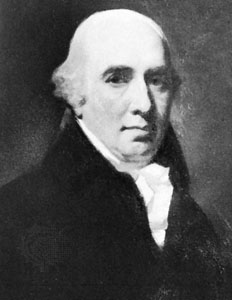| Profile | Major Works | Resources |
Dugald Stewart, 1753-1828.

Scottish Enlightenment philosopher.
Born in Edinburgh, Dugald Steward was the son of Matthew Stewart, a professor of mathematics at the University of Edinburgh. Dugald studied mathematics at his father's university in Edinburgh, where he learned moral philosophy and economics from Adam Ferguson. But of perhaps greater impact was one year (1771) Dugald spent at the University of Glasgow, where he came under the influence of Thomas Reid and Adam Smith. Dugald Stewart would go on to become a faithful promoter of their theories.
Stewart's interest in moral philosophy and economics was initially put on hold, as he returned to Edinburgh in 1772 to take over his ailing father's mathematics classes. Stewart was elected to the chair in mathematics in 1775, and continued to teach the subject for the next ten years. But Dugald Stewart eventually went on to succeed Adam Ferguson in the Chair of Moral Philosophy at the University of Edinburgh in 1785. Stewart would teach moral philosophy at Edinburgh until his retirement in 1809, and spent his ample remaining years putting out editions of his works on moral philosophy.
Dugald Stewart's principal work is his Elements of the Philosophy of the Human Mind, which came out in three widely-spaced volumes over the course of his career (v.1 in 1792, v.2 in 1814 and v.3 in 1827).
Dugald Stewart had a long and highly influential tenure as moral philosophy professor. Stewart was possibly the first academic to teach a university course explicitly dedicated to political economy (in 1799-1800, lecture notes published posthumously in 1855-56). Among Dugald Stewart's notable students were utilitarian radicals like James Mill and Joseph Hume, the Edinburgh Review gang (Sydney Smith, Francis Jeffrey, Francis Horner, Henry Brougham, Macvey Napier), and several prominent liberal Whig politicians, like Henry Petty Fitzmaurice (Marquis of Lansdowne), Lord John Russell and Henry John Temple (Viscount Palmerston).
Dugald Stewart's principal follower, the philosopher Sir William Hamilton, put out an edition of his collected works in 1854-58. .
|
Major Works of Dugald Stewart
|
|
HET
|
|
Resources on Dugald Stewart
|
All rights reserved, Gonšalo L. Fonseca
